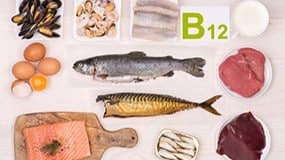What to know
Infants need vitamin B12 to support brain development and produce healthy red blood cells. Learn how a breastfeeding mother's diet is important to make sure her infant gets enough vitamin B12.

Breastfeeding and vitamin B12 in infants
Why is vitamin B12 important?
Infants need vitamin B12 to support brain development and produce healthy red blood cells. Infants who do not get enough vitamin B12 can become deficient. If left untreated, vitamin B12 deficiency in infants can lead to permanent brain damage.
Do infants get enough B12 from breast milk?
Usually. Vitamin B12 is transferred through the placenta to the fetus during pregnancy and through breast milk after birth. Infants will receive enough vitamin B12 if they:
- Drink breast milk from a mother who consumes adequate amounts of vitamin B12.
- Drink infant formula.
If a breastfeeding mother is deficient in vitamin B12, her infant may also become deficient.
Vitamin B12 is most commonly found in food from animals, primarily meat, fish, milk, milk products, and eggs. Therefore, infants who receive only breast milk from mothers who do not consume animal products are at greater risk for developing vitamin B12 deficiency shortly after birth.
Breastfeeding mothers on a strict vegetarian or vegan diet should ask their health care provider about taking a supplement that contains the appropriate amount of vitamin B12.
Some breastfeeding mothers may not be able to absorb various vitamins and minerals, such as vitamin B12, folic acid (vitamin B9), iron, and calcium. Breastfeeding mothers who may not absorb these nutrients include those who:
- Have had a malabsorptive bariatric procedure, such as gastric bypass surgery.
- Have pernicious anemia, which is an autoimmune disease that can cause a deficiency of vitamin B12.
- Have certain gastrointestinal disorders.
Health care providers should monitor these mothers for nutrient deficiencies, including vitamin B12 deficiency.
